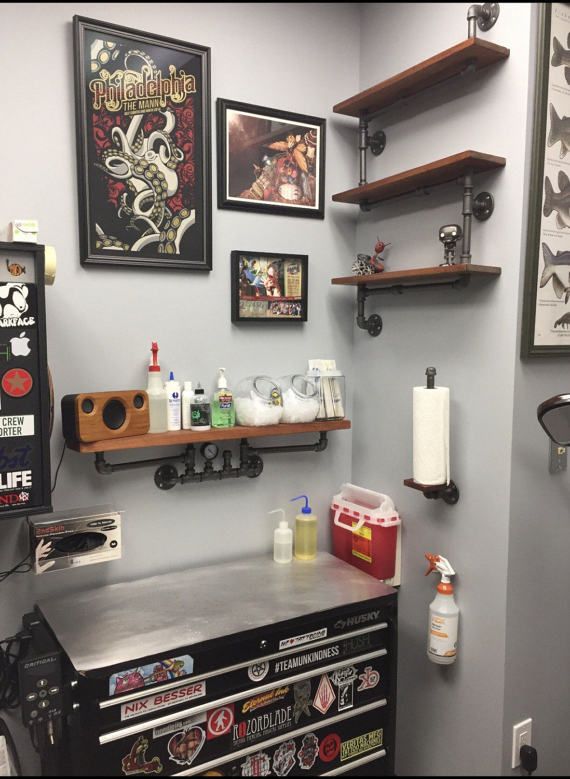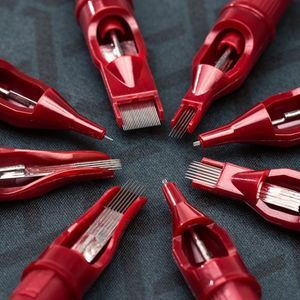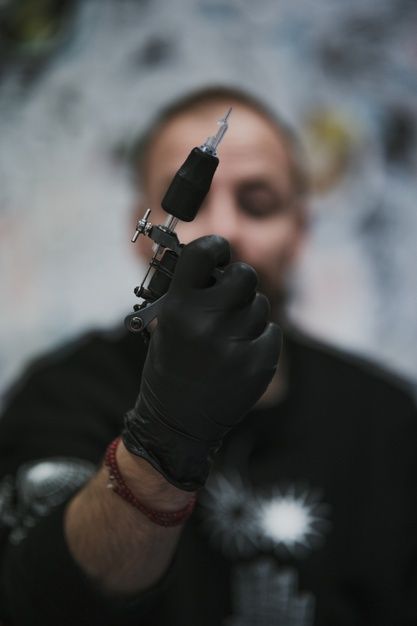
Discover Proper Tattoo Studio Hygiene Practices For Beginners
When you decide to become a tattoo artist, you assume the responsibility of following proper tattoo studio hygiene practices. These practices are aimed at protecting your clients from infection, blood-borne pathogens, and contracting any form of illness while in your care.
The COVID-19 pandemic has increased the importance of following these and other safety measures. This will ensure that every person who steps through your door is protected as much as reasonably possible.
In this post, we’ll explore all that tattoo studio hygiene entails. This includes what you should know before you attempt your first tattoo, in-studio sanitation practices, and aftercare for your clients.

General knowledge
Every tattoo artist should know:
- General and specific knowledge of how blood-borne pathogens may be transmitted during the tattooing process, particularly hepatitis B virus (HBV), hepatitis C virus (HCV), and human immunodeficiency virus (HIV).
- Basic personal hygiene, including the importance of hand washing and sanitizing as part of tattoo studio hygiene practices.
- Personal protection, including the importance of sterilization, cross-contamination, wearing gloves, and disinfection of surfaces.
- Tattoo studio hygiene practices, including the disinfection of surfaces, sterilization of equipment, cross-contamination, and proper waste disposal.
Sterilization
Your disinfectant of choice must be effective at killing the pathogens that cause diseases such as HIV, HCV, and HBV. Do not dilute these solutions or allow them to decant. Follow the manufacturer's instructions as provided regarding sterilization. Use an ultrasonic cleaner to remove stubborn pigments and blood from your tools if you do not use disposable items. Rubbing alcohol is virtually useless in an environment that needs to be sterile.
A key instrument in your sterilization process is lighting. It will help you get rid of all visible particles.
If possible, invest in an autoclave to sterilize non-disposable tools and equipment between clients.
Your Work Area
Your work area should be easy to clean. This means you should avoid absorbent materials.
Your work trolley should ideally be made of stainless steel or aluminum, but you can use tempered glass or plastic. Avoid wood and any type of fiber if you wish to use a custom-made trolley.
Your trolley should be properly organized and should only contain the instruments you need. Do not place your phone on your trolley, or use it to hold a snack. You should not be eating while tattooing. If you need to eat, take a break and eat elsewhere.
While your tattooing chairs should be comfortable, they shouldn’t be of fabric like a regular sofa. It must be upholstered with a material you can easily sterilize between uses, like leather or vinyl. Where possible, cover them with disposable chair covers that will be changed between sessions. Note that this does not omit the need for sterilization between uses.
The flooring in your work area should ideally be tile, linoleum, or polyvinyl. Mats and carpets tend to harbor germs and bacteria and are harder to keep clean. Your floors should be wiped and disinfected before and after each session.
Your work area should also contain a washstand or sink. This will allow you to wash your hands regularly with antibacterial or antiseptic soap. Do not use towels to wipe your hands. Instead, use disposable paper towels.
Your trolley should ideally have drawers or cabinets to prevent sterilized material from becoming contaminated. It should also be properly labeled to prevent disorganization.

Disposable equipment and tools
As a tattoo artist, you’ll go through a lot of certain disposable equipment and tools such as gloves, paper towels, needles, and so on. It is imperative that you do not reuse any of these materials when tattooing your clients. It does not matter if they are related, or come as friends. Each client should have their own setup that is disposed of as soon as the tattoo is finished.
Gloves
Gloves are to be worn at all times. Your workspace is a sterile area, therefore, your hands should be as sterile as possible.
Wear gloves when cleaning and sanitizing your workspace. Wash your hands thoroughly after you dispose of them, and put on a new pair when preparing your client for tattooing. Change your gloves before you start working, and ensure you wash your hands with a liquid antibacterial or antiseptic soap before tattooing. If you have to leave your sterile work area, change your gloves again and wash your hands before you resume working.
You will find that you go through a lot of gloves, but the safety of everyone comes first. Your gloves help to protect both you and your clients. Tattooing without gloves puts you at risk of blood-borne pathogens and your client at risk of infection. You can never be too careful when it comes to gloves.
Paper towels
Paper towels are going to be your best friend. By the end of the day, your waste bin will be full of them. Paper towels may be substituted for antibacterial wipes where applicable. There are a few different brands of paper towels and some work better than others. You will find that you develop a preference when it comes to paper towels, and you will need to make sure that you always have them on hand.
Cleaning brushes
Use cleaning brushes of different sizes to clean everything from tubes and tips to your work area if there are any spillages. This is more effective than wiping when it comes to sterilization and can help to get to hard-to-reach areas. Larger brushes may also be used to scrub down the sink before you start your day.
Disposable razors
You should always ensure you have enough disposable razors at the start of each day. While electric razors are more economical, you cannot use the same razor for two different clients. Shaving your client’s skin ensures the tattoo comes out precisely and prevents infection during healing. The skin should be sterilized immediately after shaving.

Needles
You should never share needles between clients. They should be discarded at the end of every session to prevent the spread of disease. Do not dispose of your needles in your regular waste bin. Invest in a needle disposal container with a cover that can properly shut, then dispose of the container once it is full. If possible, use disposable tattoo tubes and grips as they may become contaminated with blood and may be hard to clean.
Disposable ink caps
Do not dispense your tattooing ink from its original container, even if you’re doing a small tattoo. Place your ink in a disposable ink cap. Your ink bottles should remain closed at all times to prevent microorganisms from the air from contaminating the ink.
Do not return unused ink to the bottles. Each client should get a new ink cap with fresh ink.
Tongue depressor
If possible, avoid using your fingers to remove Vaseline from its container. Instead, use a tongue depressor and discard after each use. If you can get your hands on individually sterile tongue depressors, it is even better.
Eye protection
Consider investing in eye protection gear. Though this is not a requirement and many tattoo artists go without it, your eyes are just as susceptible to infection as your skin, especially during the pandemic. Eye protection helps to protect your eyes against splatter, whether it is from ink or blood.
Arm sleeves
If you like wearing short-sleeved shirts to work, consider investing in disposable arm sleeves. These are especially useful during long tattoo sessions or tattoos where you have to lean over the client to work. This is just another way to protect yourself against harmful pathogens.

Tattoo Studio Hygiene Practices For Tattoo Machines
You should also ensure your tattoo machines and clip cords are cleaned and disinfected with a proper cleaning agent. This should also be done after each use. While using coil machines, cover them with a large enough plastic bag. This helps to keep them clean because it is not easy to disinfect the nooks and crannies of a tattoo machine. For pen-style machines, a sticky barrier film may be applied.
Aftercare
You are responsible for your client’s immediate aftercare. Green Soap is a popular option used after applying a tattoo to remove residual ink and blood, and to sterilize the area before applying ointment or bandaging. Other artists use hydrogen peroxide or iodine. It’s important to ask a client about specific allergies before applying any of these products.
COVID-19 Protocols for tattoo artists
With the pandemic still looming, COVID-19 protocols are now a part of standard tattoo studio hygiene practices.
This involves:
- Adhering to a strict appointment system to avoid unnecessary contact and interaction in the tattoo studio
- Virtual consultation where necessary to observe social distancing protocols
- Temporarily banning guests or spectators with clients receiving service
- No eating or drinking in or around the work area
- Disinfecting personal items such as cell phones
- Avoid shaking your client's hand with
- Providing access to sterile hand washing station with antibacterial soap and paper towels
- Encouraging online payments
- Encourage sick clients and staff to stay at home
- Wearing face masks to prevent the transmission of the virus
- Staff access to full PPE gear
- Sanitizing all surfaces to kill the virus.
- Proper ventilation in the work area
- Exercise the right of refusal of entry and service to clients who refuse to adhere to set protocols
Final Word
Learning the importance of tattoo studio hygiene practices is just as important as mastering the art of tattooing itself.
Any tattoo course you take must focus on these practices and give you a comprehensive understanding of how blood-borne pathogens and infections spread. If you are looking for a comprehensive tattoo course to enroll in, we highly recommend Hugo Feist’s Black and Grey Realism Course to further your tattooing career. In the meantime, invest in proper sanitization and disinfection products, along with all the disposal equipment and tools required to keep your work area sterile.
In light of the COVID-19 pandemic, you will be required to adhere to additional protocols to help slow the transmission of the virus. When combined, all these requirements will help to keep both you and your clients safe.
Find out 15 Top Tattooing Tips that will advance your skills to the next level
Stay connected with news and updates!
Join our mailing list to receive the latest news and updates from our team.
Don't worry, your information will not be shared.
We hate SPAM. We will never sell your information, for any reason.



